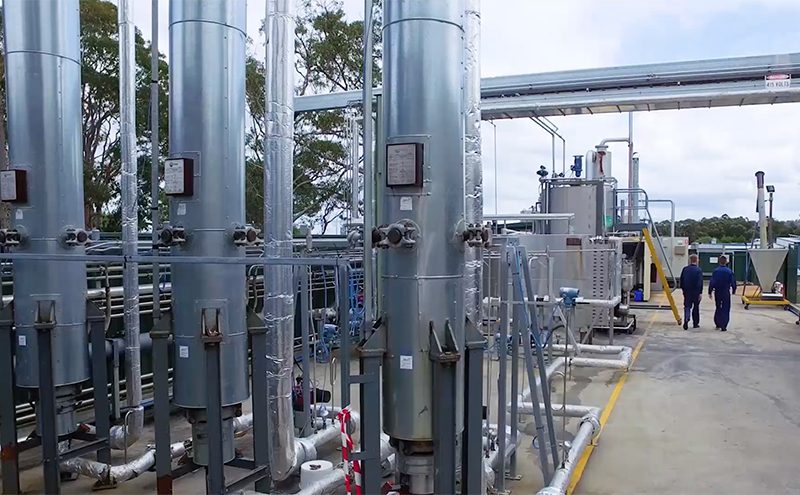
Plastic recycling firm ReNew ELP says it predicts 2019 will be the “breakthrough year” for chemical recycling, but calls on Government to support sector
A UK company behind plans to build a state-of-the art plant to chemically recycle waste plastics says that 2019 will be the “breakthrough year” for the technology, but has called on the Government to provide more support to help the sector to get off the ground.
ReNew ELP plans to start construction on its first plastic recycling plant in Teesside early next year. The process will convert 20,000 tonnes per annum of plastic waste that would otherwise go to landfill or incineration into recycled petrochemicals and oils for the chemical sector.
Richard Daley, Managing Director of ReNew ELP, said: “Society is increasingly aware of the issues posed by waste plastic and people are keen for innovative firms to come up with solutions to the problem. There are so many exciting developments in the field of chemical recycling right now and many companies are ready to scale up their operations over the next few years.
“The UK has a fantastic opportunity to become a world leader in plastic recycling, leading the charge to develop innovative technologies that will address the huge challenges we have with non-recyclable waste plastic.
“Next year I believe we’ll see real breakthroughs for chemical recycling as the preferred treatment for plastic waste, because it contributes to the vision for a sustainable, circular economy and recovers the enormous value from waste plastic – value that is currently lost through landfill or incineration.”
Chemical recycling is an umbrella term for technologies that recycle plastic using a chemical process to break up the polymers in the material, enabling new products and materials to be manufactured.
Renew ELP’s process targets plastic that cannot be recycled by traditional mechanical recycling methods. This material currently ends up in landfill or as a fuel for incineration, but chemical recycling can significantly expand the circular economy and reduce raw material consumption by replacing fossil fuels as a feedstock for plastic production.
ReNew ELP’s technology uses a patented Catalytic Hydrothermal Reactor (Cat-HTR), which has been developed by Australian-based hydrothermal upgrading pioneers, Licella, over the past 10 years.
Cat-HTR differs from competing technologies such as gasification or pyrolysis as it uses water under supercritical conditions to break down a wide range of plastics to their original component molecules.
These molecules are then rearranged to produce new chemicals and recycled oils which can replace fossil fuels in the production of new plastic and provide feedstocks for the chemical sector. The use of water significantly improves the energy efficiency of the process, as feedstocks do not need to be dried prior to treatment.
Around 6% of global oil and gas output is used in the production of plastics annually but of the 311 million tonnes of plastics produced each year, only 5% is currently recycled, equating to lost value of £70 billion per year.
Daley said: “Chemical recycling offers very real opportunities to create a circular economy for plastics. By breaking down waste plastics into their original state the technology provides a sustainable, low carbon feedstock which can be used to produce new plastic without the need for virgin fossil fuels.
“Our Cat-HTR process can recycle a wide range of plastic types that are currently considered unrecyclable. An independent analysis has demonstrated that Cat-HTR can achieve a greenhouse gas reduction in excess of 70%, compared to the use of fossil fuel feedstocks.”
Daley believes that recent developments will lead to increased demand for technologies that can generate low carbon, recycled plastic products, while tackling the problem of high volumes of plastic waste.
“The recent decision by the Chinese to close export markets for waste plastic, coupled with rising landfill taxes in the UK and public pressure to deal with plastic pollution, are encouraging the plastic and packaging industry to increase their use of recycled plastic,” Daley continued.
“Indeed, the Chancellor has recently pledged to tax plastic packaging made with less than 30% recycled content and to review the UK’s Producer Responsibility System, which will increase demand for plastics with a high recycled constituent.
“However, the sector requires support from the Government to enable the economic and environmental benefits of chemical recycling to be fully realised. We are calling on the UK Government to recognise chemical recycling as a low carbon recycling technology and to develop a clear policy framework that will support the production of recycled carbon feedstocks.
“It is crucial that the Government acts to provide developers and investors with the clarity they need. Widespread adoption of chemical recycling over alternative disposal methods like incineration is the only way to establish a circular economy for plastics.”







